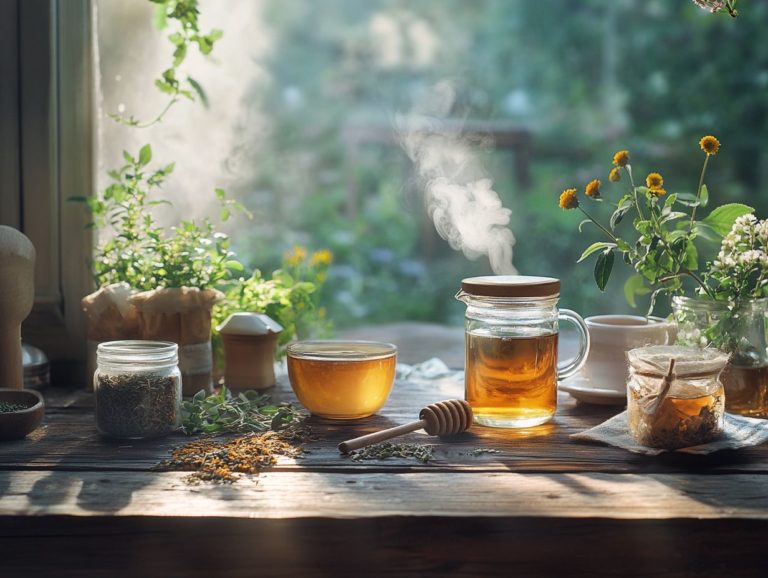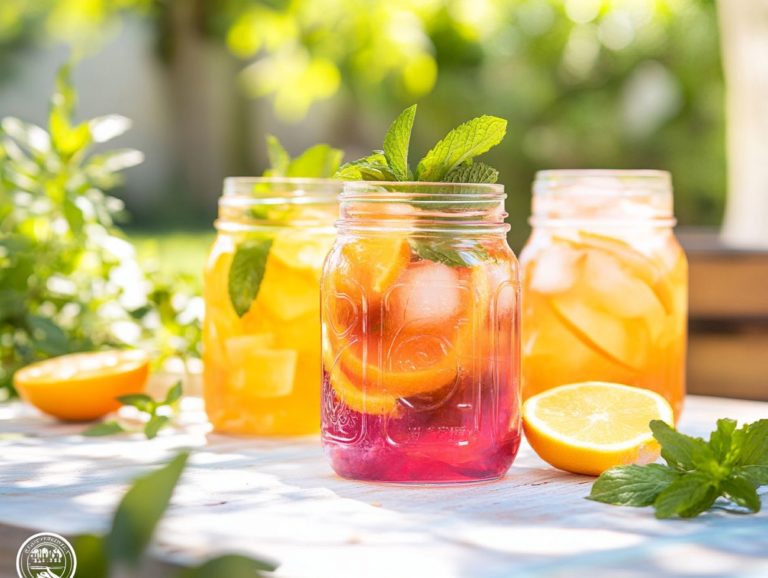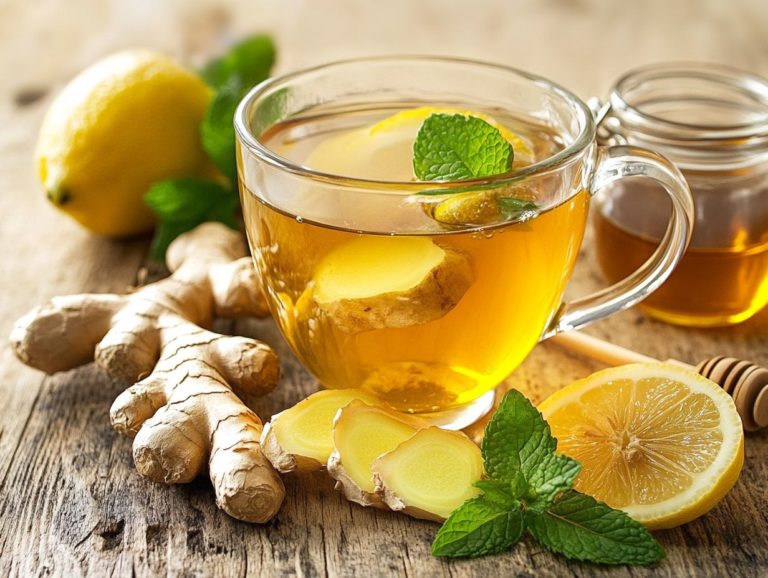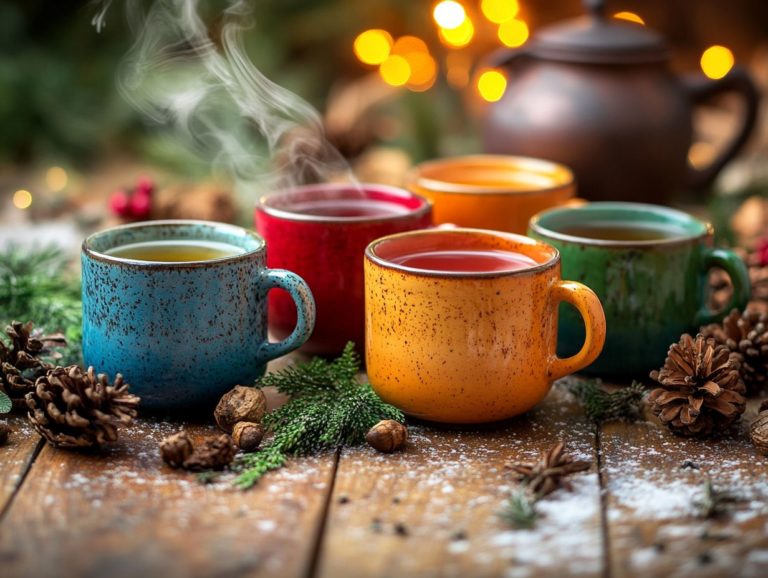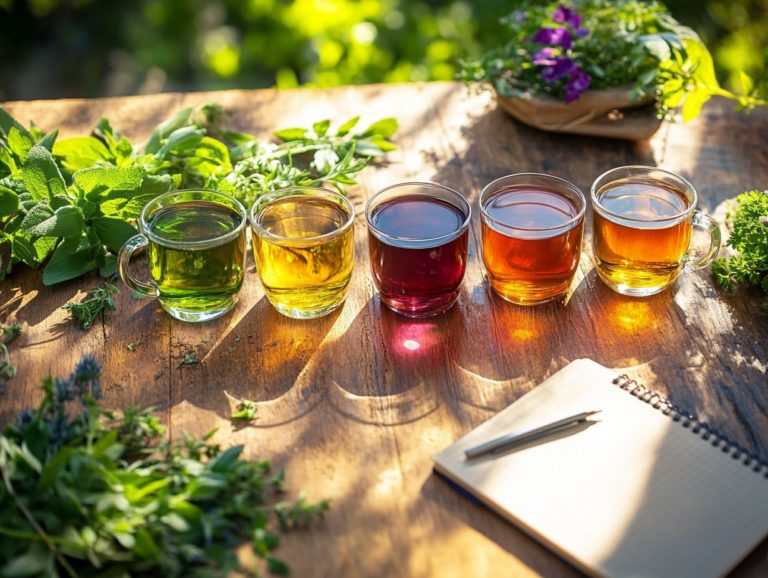5 Easy Herbal Tea Recipes for Beginners
Herbal tea is popular for its delightful flavors and numerous health benefits. Let s dive into the soothing world of herbal tea!
You ll learn how to choose the right herbs and equipment for brewing. Plus, we ll share five easy recipes just for beginners!
Ready to craft the perfect cup? You ll get tips on brewing, health benefits, and answers to your questions.
Embark on this flavorful journey and elevate your herbal tea experience!
Contents
- Key Takeaways:
- 2. Choosing the Right Herbs for Your Tea
- 3. Basic Equipment and Ingredients Needed
- 4. 5 Easy Herbal Tea Recipes for Beginners
- 5. Tips for Brewing the Perfect Cup of Herbal Tea
- 6. Benefits of Drinking Herbal Tea
- 7. Precautions and Possible Side Effects
- Discover Your Favorite Herbs for Herbal Tea!
- Frequently Asked Questions
- 1. What are some easy herbal tea recipes for beginners?
- 2. Can I make herbal tea with just dried herbs?
- 3. Are there any health benefits to drinking herbal tea?
- 4. Can I customize these herbal tea recipes?
- 5. Can I store these herbal tea recipes for later use?
- 6. Are there any potential side effects of drinking herbal tea?
Key Takeaways:
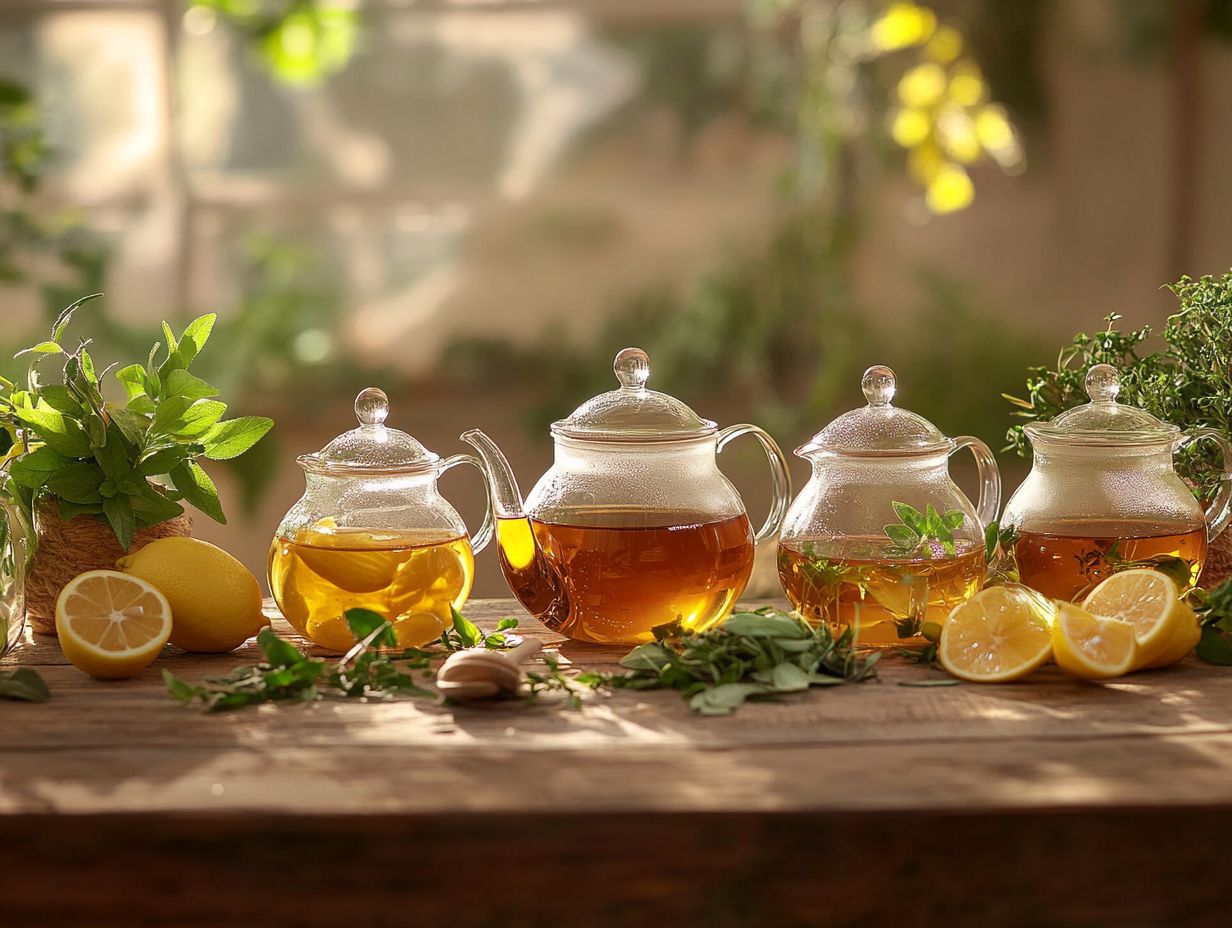
- Herbal tea is a tasty and simple way to enjoy the benefits of herbs daily.
- Choosing the right herbs, tools, and brewing methods is key to making delicious herbal tea blends.
- Feel free to experiment with various herbs to discover your favorite tea flavors and health benefits!
2. Choosing the Right Herbs for Your Tea
Choosing the right herbs for your herbal tea is crucial for crafting a beverage that is both flavorful and tailored to your personal needs and preferences.
With so many options available, understanding the features and taste of different herbs can enhance your tea experience. Take refreshing mint, for example; it offers a cool burst of flavor that invigorates the senses. On the other hand, thyme presents earthy notes that add depth and complexity to your brew.
If you’re in the mood for something warm and spicy, ginger is perfect for boosting digestion, while lavender brings a soothing floral essence that promotes relaxation.
Combining these herbs can lead to unique and delightful tea blends. Imagine mixing ginger and mint for a revitalizing concoction or pairing thyme with lavender to transport yourself to a tranquil state of mind.
When selecting herbs, think about the health benefits you’re after whether you’re aiming to ease digestive discomfort or unwind after a long day, there’s a herbal combination just waiting for you to discover.
3. Basic Equipment and Ingredients Needed
To prepare the perfect cup of herbal tea, gather a few essential pieces of equipment and select high-quality ingredients that promise a delightful brewing experience.
A sturdy kettle for boiling water and a reliable tea strainer are fundamental tools in your arsenal. Prioritizing fresh herbs and organic ingredients not only elevates the flavor but also enriches the health benefits of your tea.
Incorporating sweeteners like stevia or organic sugar can further enhance the overall taste profile. If you’re eager to embark on a DIY tea adventure, experimenting with different herbs and spices can be a delightful journey, allowing you to customize your brew to perfection.
4. 5 Easy Herbal Tea Recipes for Beginners
For those just stepping into the enchanting realm of herbal tea, here are five straightforward recipes that you can whip up with ease, such as chamomile tea or lemon ginger tea, allowing you to explore a delightful array of flavors and health benefits right in your own kitchen.
These recipes invite you to immerse yourself in the refreshing universe of herbs, encouraging both personalization and creativity. By incorporating fresh herbs along with a few everyday ingredients, you can effortlessly craft delightful beverages that invigorate the senses, much like the 5 must-try herbal preparations for better sleep.
Consider how beautifully mint harmonizes with lemon, or how chamomile dances with honey and lavender for a truly soothing experience. Each suggestion showcases unique flavor pairings and serves as a springboard for your own culinary exploration.
Whether you imagine a robust herbal chai or a revitalizing iced tea for those sun-drenched days, the possibilities are endless!
4.1 Chamomile and Lavender Tea
Chamomile and lavender tea is a soothing drink known for its calming effects. It s perfect for unwinding after a long day.
This delightful blend combines the gentle floral notes of chamomile, which helps reduce anxiety, with the lovely scent of lavender, which promotes restful sleep. Together, they create a peaceful atmosphere that enhances your emotional well-being while lowering stress levels.
The health benefits don t stop there. Chamomile also helps with digestion, and lavender boosts mood and alleviates headaches. To brew this comforting tea, simply follow these easy steps:
- Boil water.
- Add equal parts of dried chamomile flowers and lavender buds.
- Steep for about five to seven minutes.
- Savor every sip in a cozy setting.
Enjoying this tea can transform your evening into a blissful experience!
4.2 Peppermint and Lemon Balm Tea
Peppermint and lemon balm tea offers a refreshing flavor that delights your palate and aids digestion, making it the perfect after-meal beverage.
This herbal infusion combines the invigorating qualities of peppermint with the soothing attributes of lemon balm. Together, they create a harmonious blend that helps alleviate bloating, relieve indigestion, and promote overall gut health. Sipping a cup after a hearty meal works wonders since both herbs are known for their calming effects on the digestive system.
If you’re in the mood for a simple yet delicious iced tea, steep a handful of fresh peppermint leaves and a few lemon balm sprigs in boiling water, then allow it to cool. Serve it over ice, perhaps garnished with a slice of lemon for that vibrant touch, and relish its revitalizing essence on a warm day. For more ideas, check out these delightful DIY herbal teas for wellness.
4.3 Ginger and Turmeric Tea
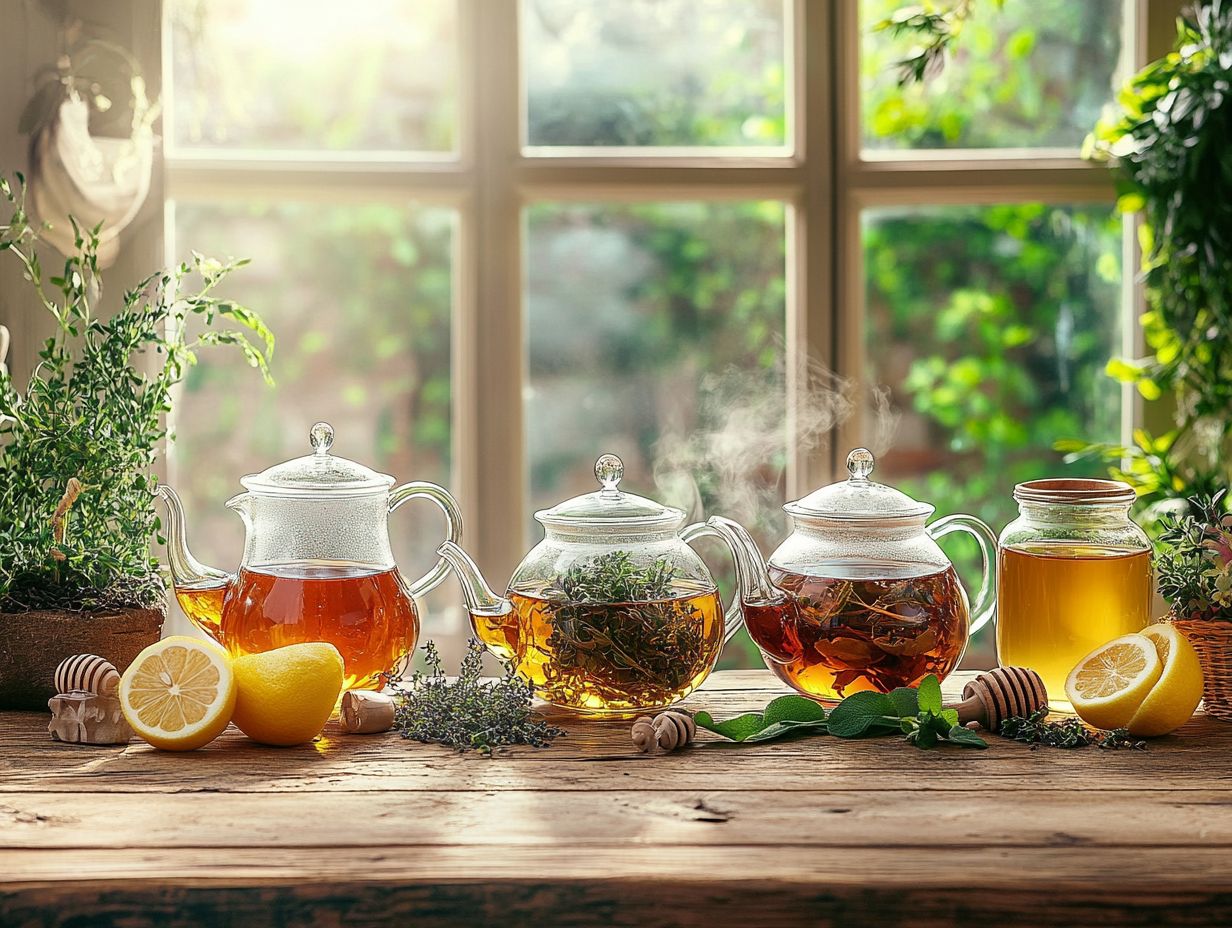
Ginger and turmeric tea is your go-to herbal blend celebrated for its impressive anti-cancer properties and immune-boosting benefits, making it an essential part of your wellness toolkit.
Rich in antioxidants, this tea works diligently to combat inflammation and can help alleviate symptoms of arthritis and other chronic conditions. Integrating these remarkable roots into your daily routine can unlock improved digestion and a boost in energy levels.
To craft this invigorating drink, simply steep slices of fresh ginger and turmeric in boiling water for around 10 minutes. For an extra kick, consider incorporating a pinch of black pepper to enhance the absorption of the active ingredient in turmeric that helps with health, or add a dash of cinnamon for its anti-inflammatory benefits.
Don t hesitate to experiment with variations try adding some fresh mint or a splash of lemon for a refreshing twist.
4.4 Rosehip and Hibiscus Tea
Rosehip and hibiscus tea is not just a feast for the eyes; it’s brimming with health benefits, especially its impressive vitamin C content that bolsters your overall well-being, making it a great choice for summer tea.
But the perks don t stop there. This delightful herbal infusion is celebrated for its potent antioxidant properties, which help combat oxidative stress and inflammation in your body. These natural elements play a vital role in maintaining healthy skin and enhancing your immune system.
Rosehips bring essential fatty acids to the table, while hibiscus adds anthocyanins that are great for heart health. To savor this vibrant brew, simply steep dried rosehips and hibiscus petals in boiling water for about 10 minutes.
For an extra layer of flavor, consider adding a splash of honey or a squeeze of fresh lemon juice. Feel free to experiment with herbs like mint or ginger for a refreshing twist.
4.5 Cinnamon and Clove Tea
You ll love this warming cinnamon and clove tea that wraps you in comforting flavors. It’s perfect for chilly evenings or cozy gatherings.
This blend not only tantalizes your taste buds but also offers numerous health benefits. With its rich antioxidant content, cinnamon can help regulate blood sugar levels. Cloves are known for their anti-inflammatory properties. Together, they create a soothing drink that may aid digestion and boost your immune system.
Preparing this tea is simple: steep a cinnamon stick and a few whole cloves in boiling water for 10 minutes. For a seasonal twist, add honey and a slice of orange in winter or a splash of lemon in summer. To explore more options, check out how to make your own herbal tea at home. This makes it a refreshing drink to enjoy all year round.
5. Tips for Brewing the Perfect Cup of Herbal Tea
Brewing a perfect cup of herbal tea is an art that combines technique with an appreciation for flavor. This guide even includes options for cold brew tea enthusiasts!
To master this art, pay attention to key factors. Water temperature is crucial; different herbs work well at specific temperatures, affecting how flavors and aromas are extracted. For a refreshing cleanse, consider trying herbal detox tea recipes. Steeping time is also vital—steep for too little, and your tea may taste weak; steep for too long, and bitterness can take over.
Consider the herb-to-water ratios, as this balance significantly affects the tea’s strength and richness. Enjoy experimenting with various tea blends to discover delightful flavors and personalize your experience with each brew.
6. Benefits of Drinking Herbal Tea
Drinking herbal tea offers many health benefits, from boosting your immune system to aiding digestion. It s also a delightful caffeine-free alternative for tea lovers.
Incorporating herbal varieties like ginger, known for its anti-inflammatory benefits, can enhance your digestive health. Ginger helps alleviate nausea and promotes smoother gastrointestinal function.
Hibiscus tea stands out for its rich antioxidant content, which may help lower blood pressure, contributing to heart health.
Many people find solace in chamomile, celebrated for its calming effects. It can help reduce anxiety and improve sleep quality, making it a perfect addition to your evening routine.
Scientific studies support these benefits, with research backed by clinical trials and countless personal experiences that highlight the positive impacts of herbal tea on overall wellness.
7. Precautions and Possible Side Effects
While herbal tea is generally safe for most people, it s important to be aware of certain precautions and potential side effects linked to specific herbs.
If you have allergies, be cautious; herbs like chamomile may provoke allergic reactions, especially if you re sensitive to related plants. Some herbal ingredients can also interact negatively with prescription medications, including antidepressants and blood thinners. Always consult a healthcare professional, especially if you have existing health issues or if you’re pregnant or nursing.
By being mindful of these considerations, you can enjoy the soothing benefits of herbal tea without unexpected complications.
Call to Action: Try making your own herbal tea blends at home and explore the wonderful flavors and benefits they offer!
Discover Your Favorite Herbs for Herbal Tea!
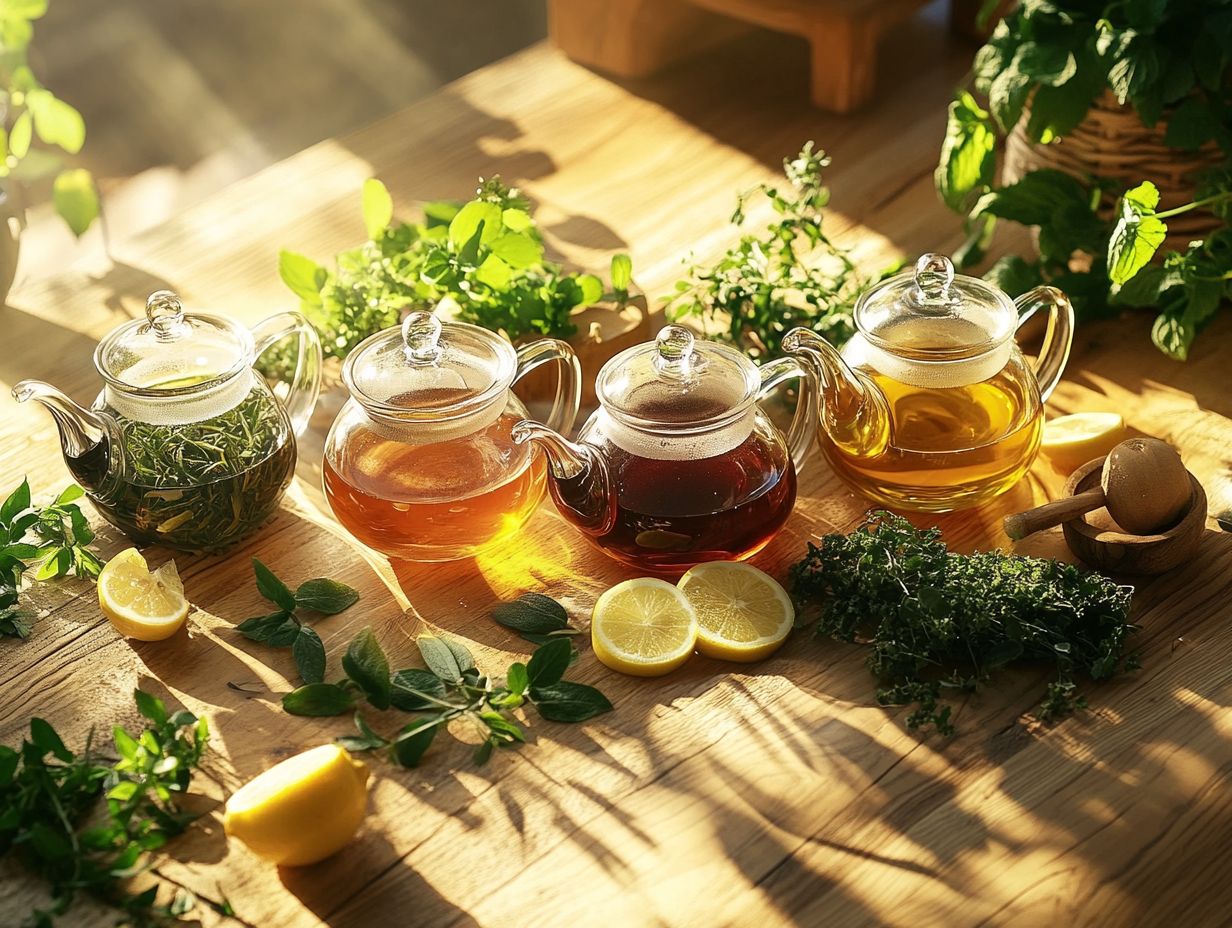
Among the many options available, certain herbs truly stand out as your go-to choices for crafting flavorful and beneficial herbal tea blends.
Chamomile has gentle, sweet, and slightly floral notes. It s celebrated for its soothing qualities, promoting relaxation and aiding digestion.
Mint brings a refreshing zing that invigorates your palate. It also offers digestive relief and a delightful cooling sensation.
Hibiscus, with its striking red hue, adds a tart flavor. This herb provides a unique taste and potential heart health benefits.
This variety of flavors and health properties is precisely why these herbs continue to be favored in tea recipes around the globe.
How Can You Create Your Own Herbal Tea Blends?
Creating your own herbal tea blends is a delightful journey into flavor! It allows you to customize your beverage to meet your unique health needs.
By selecting a variety of herbs, you not only craft a distinct taste experience but also tap into the numerous wellness benefits each ingredient can offer. For example, when you blend chamomile with lemon balm, you invite a soothing effect, while adding ginger introduces a zesty spice that aids digestion. To get started, consider exploring 5 essential herbal preparations for beginners to enhance your herbal journey.
To achieve a harmonious fusion, it’s crucial to consider the balance of flavors. Mixing stronger herbs with milder ones can enhance the overall profile. For those looking for specific combinations, check out the top 5 DIY herbal remedies for stress relief. Embrace the joy of experimentation! Keeping track of your favorite combinations will guide you in perfecting signature blends that cater to your individual preferences and health aspirations over time.
What Are the Different Methods of Brewing Herbal Tea?
There are several methods for brewing herbal tea, each offering a unique flavor experience tailored to your preferences and the occasion.
For instance, hot steeping is a popular choice that lets the vibrant flavors of herbs and spices unfold rapidly, typically within just a few minutes. Cold brew tea, on the other hand, is made by steeping herbs in cold water for several hours, resulting in a smooth flavor.
Using a tea strainer can elevate your brewing process, allowing you to mix various herbs and control steeping time with precision. For the best results, it’s essential to experiment with different temperatures and steeping durations, as well as pair complementary herbs to unlock the full spectrum of flavors. You can also try out some refreshing iced herbal tea recipes for summer to make the most of your herbal blends.
Are There Any Herbal Tea Recipes That Help with Specific Health Conditions?
Certain herbal tea recipes can be your allies in targeting specific health conditions, offering natural support for issues like digestion and immune system function.
These remedies often blend a variety of herbs, each with unique properties that may alleviate symptoms or enhance overall wellness. For instance, peppermint tea doesn t just soothe an upset stomach; it can also banish headaches and help reduce stress levels.
Ginger tea, on the other hand, is renowned for its anti-inflammatory effects and its prowess in easing nausea. And let’s not overlook chamomile it s a calming herb that works wonders for anxiety and encourages restful sleep.
That said, it s crucial to keep in mind that while these herbal remedies can be quite beneficial, consulting with a healthcare provider before adding them to your health regimen is essential. This ensures they effectively complement any ongoing treatments or conditions you may have.
What Are the Common Myths About Herbal Tea?
Despite its popularity, herbal tea is often shrouded in myths and misconceptions that can mislead you about its uses and benefits.
People often believe all herbal teas are caffeine-free. However, some blends, like yerba mate or guayusa, contain caffeine. It’s essential to remember that herbal teas shouldn’t replace professional medical advice.
By educating yourself on the specific properties of each herbal tea, you can gain a clearer understanding, allowing you to savor these beverages more fully and responsibly.
Why not experiment with some of these herbs today and find your perfect herbal tea blend?
Frequently Asked Questions
1. What are some easy herbal tea recipes for beginners?
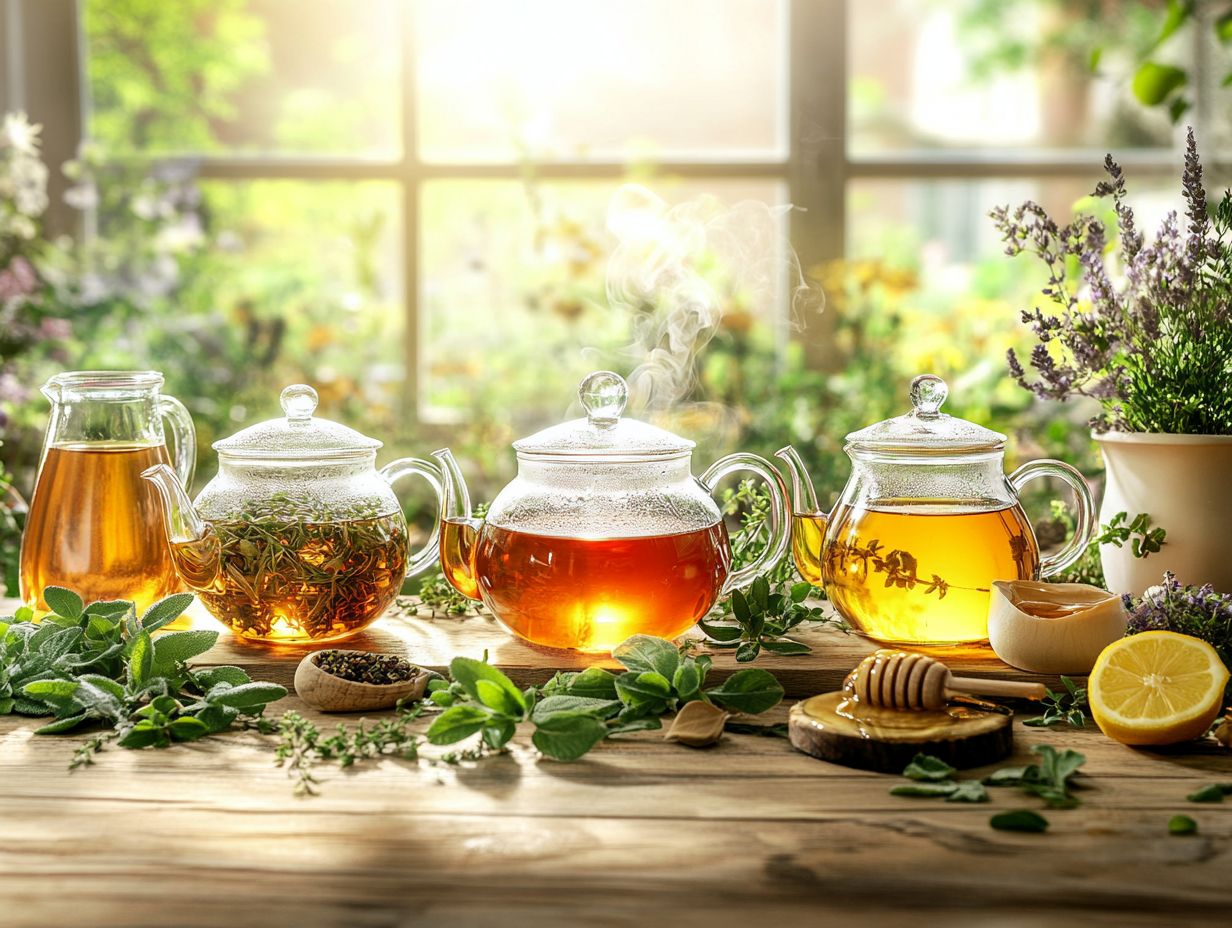
Here are five simple and delicious herbal tea recipes:
– Chamomile and Mint Tea
– Ginger and Lemon Tea
– Lavender and Rose Tea
– Cinnamon and Clove Tea
– Hibiscus and Orange Peel Tea
2. Can I make herbal tea with just dried herbs?
Absolutely! You can easily make herbal tea with dried herbs. Just soak them in hot water for a few minutes, then strain before drinking.
3. Are there any health benefits to drinking herbal tea?
Yes! Herbal tea can offer various health benefits depending on the herbs. For instance, chamomile is known for promoting relaxation, while ginger can help reduce inflammation and support your immune system.
4. Can I customize these herbal tea recipes?
Get creative! Adjust the amount of herbs or add ingredients like honey or lemon to match your taste.
5. Can I store these herbal tea recipes for later use?
You can store these recipes in a sealed container in a cool, dry place for up to a month. Just label them with the herbs used and the date made!
6. Are there any potential side effects of drinking herbal tea?
While herbal tea is generally safe, always check for allergies to any herbs. Consult a healthcare professional before adding herbal tea to your diet, especially if you have health conditions or are on medication.

